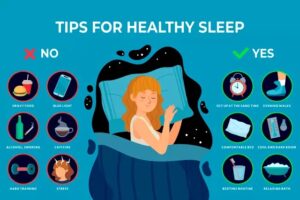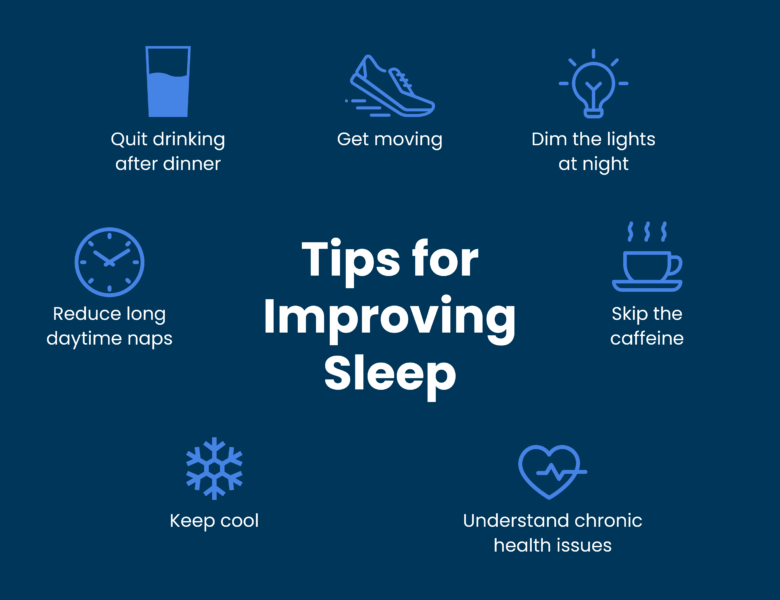On July 23, 2024, NEJM Evidence published a comprehensive review on healthy sleep, covering multiple aspects, including the components of sleep health, the impact of sleep on mood, cognition, and long-term health, and offering 10 key recommendations for improving sleep.
Components of Sleep Health
Sleep health encompasses several dimensions:
- Adequate Sleep Duration
Refers to the amount of sleep needed within a 24-hour period. Sleep needs vary between individuals, and the recommended sleep duration differs across age groups.Recommended Sleep Duration by Age:
- 4–12 months old: 12-16 hours (including naps)
- 1-2 years old: 11-14 hours (including naps)
- 3-5 years old: 10-13 hours
- 6-12 years old: 9-12 hours
- 13-18 years old: 8-10 hours
- Adults: 7-9 hours
- Continuous and Efficient Sleep
Sleep efficiency refers to the proportion of time spent actually sleeping while in bed. Higher efficiency means the sleep is uninterrupted and restful, whereas difficulty falling asleep or waking up frequently indicates low efficiency. - High-Quality Sleep
Individuals should wake up feeling rested and alert, indicating that the sleep quality was good. This can be measured through self-reports or Likert scales. - Consistent Sleep Timing
The bedtime (time when sleep begins) and wake time (time when sleep ends) should be consistent throughout the week. Ideally, the timing of sleep should align with natural light/dark cycles.
The Impact of Sleep on Mood, Cognition, and Health
Mood and Mental Health:
Sleep deprivation can lead to emotional instability, including irritability and mood swings. Studies have shown that sleep-deprived individuals react more intensely to negative stimuli, with the brain’s emotional center, the amygdala, showing 60% increased activation when exposed to negative images after 35 hours of sleep deprivation.
Cognitive Function:
Lack of sleep impairs fundamental cognitive functions, such as alertness and attention. Sleep deprivation has been linked to impaired glucose metabolism in the prefrontal cortex, an area involved in executive function and decision-making. Studies show that sleep-deprived individuals exhibit poorer decision-making abilities and reduced pattern recognition skills.
Long-term Health:
Chronic sleep deprivation is associated with several adverse health outcomes. Epidemiological studies indicate:
- Individuals who sleep less than 6 hours have a 2-fold increased risk of high blood pressure.
- Short sleep durations (<6 hours) are associated with a 2.4-fold increased risk of mortality in older adults.
- Lack of adequate sleep increases the risk of diabetes, obesity, and cardiovascular diseases.
10 Key Tips for Healthy Sleep

Here are widely recognized tips for improving sleep:
- Maintain Consistent Sleep Times
Going to bed and waking up at the same time every day helps establish a regular sleep pattern and makes it easier to fall asleep and stay asleep. - Take Short Naps When Needed
A short nap (≤ 20 minutes) can be beneficial, but long naps (≥ 90 minutes) may interfere with nighttime sleep. Those who have trouble sleeping at night should avoid napping. - Limit Caffeine After Lunch
Caffeine can stay in the system for several hours and keep you alert for 6 hours or longer. Limit its intake after midday to ensure it doesn’t interfere with your sleep. - Limit Alcohol Consumption
While alcohol may initially make you sleepy, it disrupts sleep quality and increases the chances of fragmented sleep. - Avoid Smoking Before Bed
Nicotine is a stimulant that can delay sleep onset, making it harder to fall asleep. - Exercise Regularly
Regular physical activity during the day can help reduce stress and make it easier to fall asleep at night. - Create a Dark, Quiet, and Cool Sleep Environment
Exposure to light and noise at night can disrupt sleep. Consider using earplugs or white noise machines to block out noise, and use blackout curtains or sleep masks to eliminate light. Avoid watching TV or using electronic devices before bed, as these can delay sleep onset. - Keep Clocks Out of the Bedroom
Avoid checking the time during the night. This can cause cognitive arousal, making it harder to get back to sleep. - Avoid Eating Before Bed
Try to have dinner at least 1.5 to 2 hours before going to sleep. Eating too close to bedtime can cause discomfort and disturb sleep. - Limit Exposure to Electronics Before Bed
Bright screens emit blue light, which signals the brain to stay alert. Avoid using devices such as smartphones, tablets, and computers in the hour leading up to sleep.
Conclusion
By following these 10 evidence-based recommendations, individuals can improve the quality and efficiency of their sleep, leading to better mood, cognitive function, and overall health. Consistency, managing lifestyle factors like diet and exercise, and creating a conducive sleep environment are all essential components of achieving optimal sleep health.




